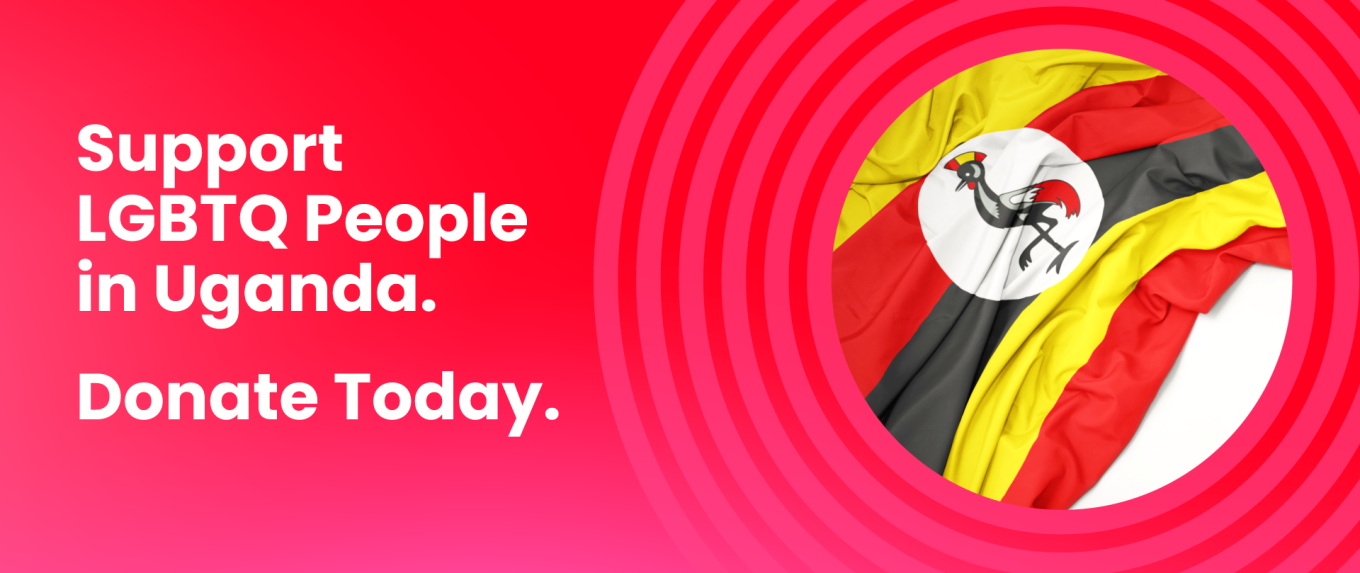
Fund
Support LGBTQ People in Uganda
Why Outright Takes Action
On May 29, 2023, Uganda's President Yoweri Museveni signed the 2023 Anti-Homosexuality Bill, one of the world's toughest anti-LGBTQ laws. We pledge our support to Ugandan activists who sacrifice their safety and security to defend human rights. We ask for your help in our fight to challenge and end this extremism in Uganda and across the region.

Outright International is deeply troubled by the passage of Uganda's Anti-Homosexuality Act by the country's parliament. The bill was signed into law by President Yoweri Museveni, further entrenching the state-sanctioned discrimination against lesbian, gay, bisexual, transgender, and queer (LGBTQ) people in the East African nation. It also seeks to build on the original 2014 Anti-Homosexuality Act, which was invalidated by the Constitutional Court of Uganda on procedural grounds.
This draconian law has attracted international condemnation as possibly the worst anti-LGBTQ law anywhere in the world, imposing the death penalty for some forms of consensual same-sex conduct. And we reiterate that this is a horrible law for Ugandans, for their allies. It's also horrific for anybody in the nonprofit sector, the corporate sector, and the humanitarian sector working in Uganda who respects the fundamental human rights of LGBTQ people.
The new Ugandan law is based on a genocidal ideology aimed at eradicating LGBTQ people from public existence. We call on Uganda to honor its international commitments and respect the human rights of everyone, including LGBTQ people, as no one should be denied these rights based on their sexual orientation or gender identity,” Maria Sjödin, Executive Director of Outright International, noted.
Learn more from our secured media coverage: WNYC, NewzRoom Afrika, eNCA, Washington Blade and SAfm.
Background
Same-sex relations have been criminalized in Uganda since British colonial times. Sections 145 on “unnatural offenses” and 148 on “indecent practices” have been retained in the Penal Code since independence. “Carnal knowledge against the order of nature” between men carries a maximum sentence of life in prison. The so-called “Anti-Homosexuality Act,” which foresaw imposition of the death penalty for same-sex relations, was first passed by the parliament of Uganda in 2013 and signed into law by President Museveni in early 2014. It was invalidated by the Constitutional Court of Uganda on procedural grounds the same year. Rumors of a resurrection have been circulating ever since, with the death penalty foreseen not only for same-sex relations, but also for promotion and "recruitment" of homosexuality. In May 2021, the Parliament of Uganda passed the Sexual Offences Bill. Purportedly the Bill aims to prevent sexual violence, enhance punishment against sexual offenders and provide additional protection for victims, however, it also reinforces the ban on same-sex relations.
Police regularly target, abuse, and arrest people on the basis of their presumed sexual orientation and gender identity, with forced anal examinations used against those detained, purportedly to gather evidence. Although the laws do not explicitly mention transgender and gender-nonconforming individuals, law enforcement officials often conflate gender identity with sexual orientation, and, as such, trans people are detained and charged under the same laws. Government officials have repeatedly shut down Pride events, LGBTIQ events and conferences, and raided LGBTIQ-friendly social spaces. Films, TV shows, and radio programs have been banned for “homosexual content.” Violence from private individuals is also high, and hate speech in the media is strong. Uganda has an enthusiastic and persistent LGBTIQ activist community, despite threats, violent attacks, and arbitrary arrests.
The passage of the bill follows the government’s closure of the human rights organization Sexual Minorities Uganda (SMUG) in August 2022, and the refusal to register several other organizations that work to advance LGBTQ people’s human rights. The Ugandan government also threatened in February 2023 to close the UN Human Rights office in the country, seeking to silence the voices of allies.